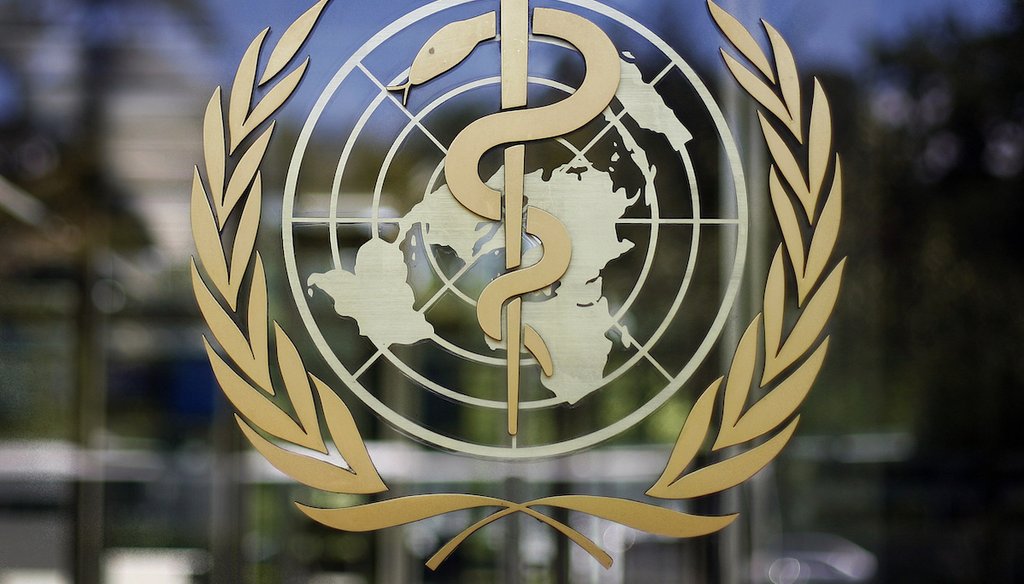

Our only agenda is to publish the truth so you can be an informed participant in democracy.
We need your help.


The logo of the World Health Organization is seen at the WHO headquarters in Geneva, Switzerland in 2009.
The World Health Organization’s member states are negotiating an agreement to strengthen pandemic prevention, preparedness and response.
The pact would not authorize the WHO to mandate vaccines or any other health policy, drafts of the agreement showed and WHO officials said.
How does PolitiFact decide our ratings? Learn more here.
A global pandemic treaty to better prepare for and respond to a future pandemic has attracted conspiracy theories since it was announced in December 2021.
PolitiFact and other fact-checkers have debunked numerous claims that the global accord the World Health Organization is shepherding will let the agency mandate lockdowns and vaccinations in the U.S. or other countries.
These baseless claims continue spreading on social media after the WHO’s December meeting to negotiate the accord.
A Jan. 24 Instagram post that misspelled "forcibly" claimed the deal’s passage would yield several bad outcomes, including that "UN troops can be deployed on your soil to round up and forceably vaccinate the population." (The WHO is a United Nations agency.)
The post was flagged as part of Meta’s efforts to combat false news and misinformation on its News Feed. (Read more about our partnership with Meta, which owns Facebook and Instagram.)
The post misleads about what the accord — which is incomplete — would do. The WHO lacks the power to force a nation to do anything against its will, and this agreement will not change that, the WHO, the U.S. Department of Health and Human Services and experts said.
(Instagram screenshot)
After the COVID-19 pandemic, the WHO’s 194 member states began planning a global accord to better prepare the world for future pandemics. The deal’s main focuses are ensuring equity in access to technology such as vaccines and information, and ensuring access to health care, the WHO said in a Q&A on its website.
In February 2023, the WHO published a "zero draft" of the accord, a framework for member states to begin negotiations. Member states, as part of the WHO’s Intergovernmental Negotiating Body, have met several times to negotiate the accord.
Those talks have yielded two updated versions of the deal:
A text from the negotiating body with input from member states published in June.
A proposal for negotiating the accord’s text published in October.
All three documents contain language affirming the nations’ sovereignty to apply their own health policies. None mention vaccine mandates or lockdowns.
The WHO in July published a YouTube video debunking misconceptions about what the treaty could do. In the video, Steven Solomon, the WHO’s principal legal officer, said the treaty "isn’t going to give WHO power to dictate vaccine mandates. The treaty won’t give WHO as an organization, as a staff, the power to dictate anything."
Recommendations from the WHO "are for countries a tool, if they want to use it, to help their response," Solomon said.
All member states are negotiating the accord and each state eventually must decide whether to sign onto the deal when it’s complete. A final draft will be presented in May 2024, the WHO’s website said. It’s unclear whether the U.S. will sign onto a final version of the agreement, or if joining would require congressional approval.
A news release after December’s meeting detailed how the WHO’s Director-General Dr. Tedros Adhanom Ghebreyesus discussed the challenge of dealing with misinformation about the accord, "including on the false claim that any agreement would result in countries ceding sovereignty to WHO." The release said the draft pandemic agreement text, "reaffirms the principle of sovereignty" in nations addressing public health matters.
A December research briefing published by the U.K. House of Commons Library also rejected the notion that the accord will give the WHO the authority to implement lockdowns, vaccine mandates or mandatory quarantines.
The claim that the WHO’s proposed global pandemic preparedness accord could result in U.N. troops entering countries and forcibly vaccinating people is False.
RELATED:
WHO pandemic accord doesn’t replace U.S. sovereignty
WHO pandemic preparedness treaty will not remove human rights protections, restrict freedoms
Disease X isn’t being planned at World Economic Forum meeting
Instagram post, Jan. 24, 2024
World Health Organization, Pandemic prevention, preparedness and response accord, June 28, 2023
World Health Organization, Governments continue discussions on pandemic agreement negotiating text, Dec. 7, 2023
World Health Organization, Zero draft of the WHO CA+ for the consideration of the Intergovernmental Negotiating Body at its fourth meeting, Feb. 1, 2023
World Health Organization, Bureau’s text of the WHO convention, agreement or other international instrument on pandemic prevention, preparedness and response (WHO CA+), June 2, 2023
World Health Organization, Proposal for negotiating text of the WHO Pandemic Agreement, Oct. 30, 2023
World Health Organization, Pandemic Accord Explained with Steven Solomon, July 17, 2023
House of Commons Library, What is the WHO Pandemic Treaty?, Dec. 14, 2023
The Associated Press, WHO ‘pandemic treaty’ draft doesn’t sign over US sovereignty, Feb.24, 2023
PolitiFact, WHO pandemic accord doesn’t replace U.S. sovereignty, Feb. 21, 2023
PolitiFact, WHO pandemic preparedness treaty will not remove human rights protections, restrict freedoms, Sept. 5, 2023
In a world of wild talk and fake news, help us stand up for the facts.
